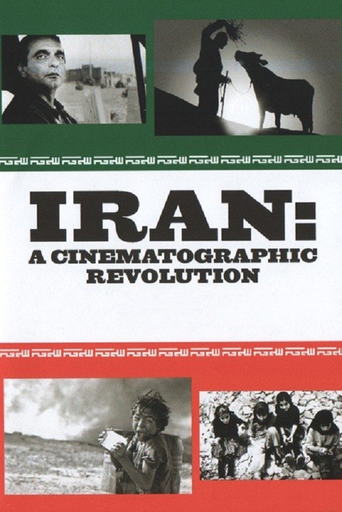MartinHafer
"Iran: A Cinematographic Revolution" is a decent overview of the film industry in Iran. Unfortunately, a LOT has happened since then and the documentary unintentionally gives you a false image of that industry.The picture talks about the history of films made in Iran stretching from the early days of the Shah in the 1920s to about 2006. It's a picture folks will particularly enjoy if they are already familiar with Iranian films. Otherwise, you might feel a bit lost. Is it great? No. I found it very odd that the films of Majid Majidi (one of the greatest Iranian directors) aren't talk about at all. Perhaps this is because many of his films might be considered sentimental and safe. A few other directors I am familiar with are also oddly missing. This brings me to what I alluded to at the beginning...that the film needs an update. Two of the directors the film championed the most and said how they were great examples of modern Iranian film were Panahi and Makhmalbaf. Well, since 2006, Panahi was placed on house arrest and forbidden to make films since he apparently offended the wrong people. And, Makhmalbaf has defected from Iran because of the rampant censorship. Plus, on a different note, the films of Farhadi aren't mentioned...and he's won two Oscars for Best Foreign Language Film.
dromasca
Nader Homayoun's documentary which I have seen on the European art channel ARTE presents a historical view of a cinematographic school that has amazed in the last few years the movie fans all over the globe presented on the background of the last half century of history of Iran. Although some of the major and better known films of the Iranian cinema are missing from this review the historical value and the interest of the documentary is kept high by this parallelism of cinema and history. It is really surprising and probably novelty for the majority of film fans to learn about the school of cinema that developed in Iran in the late 60s and the 70s - a school mature and diverse in the means of expression, socially engaged and adding its voice to the protests that led to the fall of the Shah. The tone and style changes with the Islamic revolution, which changed the rules of the artistic expression, cenzorship and social engagement of the artists as many revolutions do. The role of the Iranian cinema in the war between Iran and Iraq is also presented in details. The documentary part includes well selected excepts and interviews with some of the important directors of the period. Although film lovers who would be interested more in the aesthetics risk to be disappointed, the documentary value exceeds the expectations and makes the film worth seeing.
